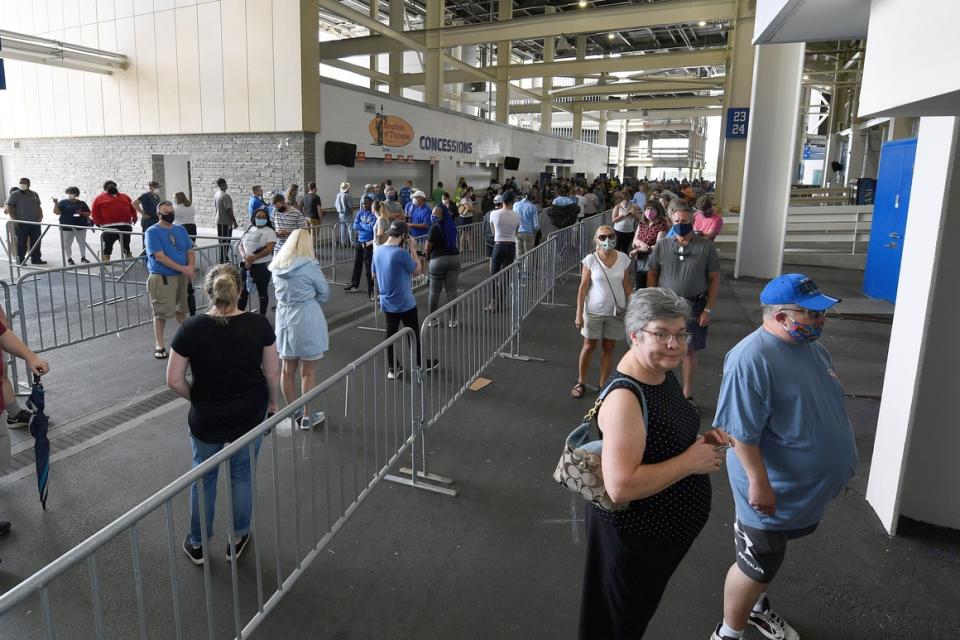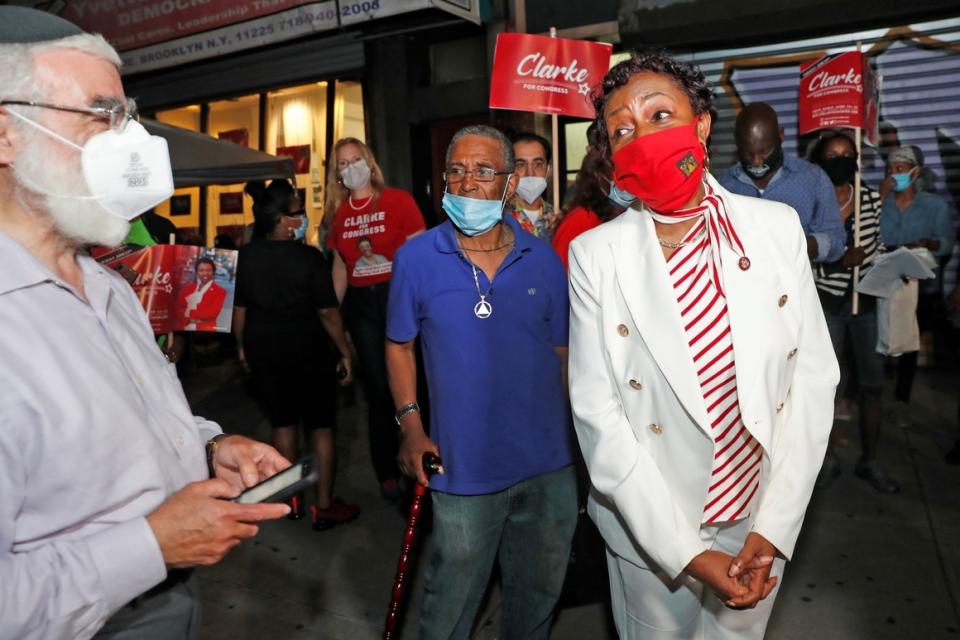Top takeaways from Tuesday’s primaries: The left, the right, the wait
The left roared into Tuesday’s primaries hoping to unseat at least one entrenched Democratic congressman in New York City and derail the Democratic establishment’s pick to face Senate Majority Leader Mitch McConnell in Kentucky.
They’re going to have to wait at least a few more days to find out whether they succeeded — but even though Tuesday night ended without final calls in many of the biggest primaries, the results clearly showed some incumbents in serious trouble and major trends shaking both parties.
Rep. Alexandria Ocasio-Cortez looks set to get some new progressive backup in New York’s congressional delegation next year. President Donald Trump’s iron-fisted grip over the Republican Party appears to be slipping. And Senate hopefuls Charles Booker and Amy McGrath are locked in a tight battle for that Kentucky Senate nomination that belies McGrath’s huge cash advantage and support from Washington power brokers.
Coronavirus drove a huge number of voters to cast absentee ballots, which won’t be tallied in either Kentucky or New York until next week. But here are five takeaways from Tuesday’s still-to-be-determined primary results:
Kentucky poised for a photo finish
When The Associated Press ended its vote count late Tuesday night, McGrath — the national party-endorsed candidate and fundraising juggernaut who has raised more than $40 million so far — had a 9-point lead over Booker with about 58,000 votes reported.
But McGrath’s lead is far from secure. The exact number of votes left to count isn’t clear, but the 58,000 tallied in early returns do not include any from the state’s two largest, most Democratic counties, Jefferson and Fayette — home to Louisville and Lexington, respectively. Those two counties have said they won’t release any vote counts until they’ve also tabulated absentee ballots, which won’t be until next Tuesday.
Louisville, home to Booker’s state House district, should be a boon for him. Booker became nationally known over the past month after joining protests against racial injustice in Louisville, where the police killing of Breonna Taylor earlier this year became a rallying point of the Black Lives Matter movement.
McGrath could fare better in and around Lexington, where she was the Democratic nominee in a battleground House race two years ago. But Election Day results showed Booker carrying some adjacent counties around Fayette, suggesting he may do well there.
Booker’s biggest obstacle may have been time. In a normal election, his late surge and Election Day performance might be enough to carry him to the nomination. But many of the as-yet-uncounted absentee ballots were cast over the past few weeks, before he caught fire at the end of the campaign.

The end is near for Rep. Eliot Engel
Unless Engel’s supporters are as obsessive about mail voting as he used to be about snagging an aisle seat for the State of the Union address, his time in the House is over.
The Associated Press did not project a winner Tuesday night between Engel and middle-school principal Jamaal Bowman, but the numbers were daunting for the incumbent: Bowman led 61 percent to 36 percent, with 36,000 votes tallied so far.
In the previous election, only 31,000 votes were cast in the Democratic primary in the district. And even though turnout is reported to be way up this year, Engel would still have to win the outstanding votes by a huge margin to survive.
Bowman stopped short of declaring victory in a speech to supporters in Yonkers but said the results showed the district is “demanding change.”
If Engel loses, he will be at least the second veteran Democrat in New York City to be ousted in as many election cycles. (Rep. Carolyn Maloney is also facing a close primary in her district.) And like Joe Crowley two years ago, the end came suddenly for Engel. While Crowley was falling to Ocasio-Cortez in 2018, Engel was cruising through a four-candidate primary with 74 percent of the vote.
Trump’s primary clout takes a hit
The president’s undefeated record in 2020 GOP primary elections came was shattered in North Carolina, and he might have his new chief of staff to blame.
Trump’s pick to succeed former Rep. Mark Meadows in a solidly Republican House district in Western North Carolina, Lynda Bennett, fell flat on Tuesday, losing by 32 percentage points to 24-year-old Madison Cawthorn in a primary runoff.
Meadows’ surprise retirement announcement late last year quickly raised suspicions about whether he timed it to help Bennett, a friend of his wife’s, win the seat. He announced he wouldn’t run again the day before North Carolina’s filing deadline — but after the deadline for candidates for other offices to withdraw their petitions, meaning state legislators in the district couldn’t switch to run for Congress instead.
Wielding Meadows’ endorsement, Bennett finished first in the March 3 primary, edging Cawthorn, 23 percent to 20 percent. But she didn’t get the 30 percent needed to avoid a one-on-one runoff. Trump tweeted an endorsement earlier this month, which Bennett quickly turned into a TV ad. But it wasn’t nearly enough, and the loss robs Republicans of an opportunity to pad the ranks of GOP women in the House, after a recent string of victories by female candidates in Republican primaries.
Meanwhile, in Kentucky, Rep. Thomas Massie easily won his Republican primary, just months after Trump called for him to be thrown out of the GOP for holding up bipartisan coronavirus relief legislation. But Trump — seeing the writing on the wall — stopped short of endorsing Massie’s opponent, Todd McMurtry, who had only 12 percent support to Massie’s 88 percent in early returns.
It wasn’t a primary, but another Trump-endorsed Republican, Rep. Denver Riggleman, was ousted earlier this month in a district nominating convention in Virginia. Trump had endorsed Riggleman in a tweet late last year, but the majority of delegates picked social conservative Bob Good as the party’s candidate in the fall.
Progressives build power in New York, romping through open seats
For the past few months, progressives fretted that large Democratic primary fields for two open House seats in New York would enable more conservative candidates to slip through and take over safe seats. But while neither the 15th District nor the 17th District was called Tuesday night, the left can breathe a little easier.
In the Bronx-based 15th District, City Councilman Ritchie Torres was in first place when the night ended, more than 10 points ahead of state Assemblyman Michael Blake and City Councilman Ruben Diaz Sr., a longtime antagonist of mainstream Democrats for his conservative views on social issues.
Torres wasn’t the top pick of movement liberals, but he was endorsed by the Congressional Hispanic Caucus’ BOLD PAC and Reps. Sean Patrick Maloney of New York, Mark Takano of California and David Cicilline of Rhode Island.
In the 17th District, in the Lower Hudson Valley, attorney and Obama-era Department of Justice alum Mondaire Jones was the leader in early returns, over self-funder Adam Schleifer and David Carlucci, a member of the breakaway faction of state Senate Democrats that kept Republicans in control of the chamber until 2018. Jones had the support of nearly every major progressive politician: Sanders, Ocasio-Cortez, Elizabeth Warren and the Congressional Progressive Caucus.
Meanwhile, while Engel is easily in the most trouble among incumbents, he won’t be the only sitting member losing sleep over the next week. Maloney ended Tuesday night with only a slight, roughly 500-vote lead over hotel executive Suraj Patel, whom she defeated in the 2018 primary.
Maloney, who took over as chair of the House Oversight Committee after the death of Rep. Elijah Cummings, had reason to worry, and she took the primary seriously. After failing to break 60 percent two years ago, Maloney went negative on Patel, running digital ads that called him “creepy.”
Faring better in initial returns was Rep. Yvette Clarke in Brooklyn. Two years after community organizer Adem Bunkeddeko came within 2,000 votes of ousting Clarke, the seven-term incumbent had a big lead in the Election Day vote when Tuesday ended.

Is America ready to wait?
Kentucky and New York aren’t opening their absentee ballots for at least a week, as both states adjust to processing many more mailed-in ballots than usual. In fact, some counties in Kentucky aren’t even counting the votes cast on Tuesday until next week. It's an early hint of the change coming to general election night in November, when Americans will face new challenges and ways to participate — and might have to wait to find out the winner of the hotly contested presidential race.
It’s been obvious for some time that voters’ desire to cast ballots by mail during the coronavirus pandemic would scramble the usual Election Day rhythm of presidential contests. Consolidated polling places and social distancing guidelines created more lines on Tuesday, though the situations in Kentucky and New York were reportedly less severe than in other states that held elections recently. But the system was far from flawless.
The patchwork of procedures in the different states — and, in Kentucky, within different counties — raises questions about voters’ expectations. The media can spend the next four months warning voters not to expect a winner during prime-time election coverage on television on Nov. 3, but it might not make a difference.
Do states and counties release results as they come in, even if questions — legitimate or in bad faith — arise about shifts in the vote count? Do they follow the example of some of the Kentucky counties and withhold results until all the votes are counted, which could raise integrity issues?
It’s difficult to overstate how messy Nov. 3 — and the days following it — could get, even after repeated test runs in primaries throughout the rest of this year.

